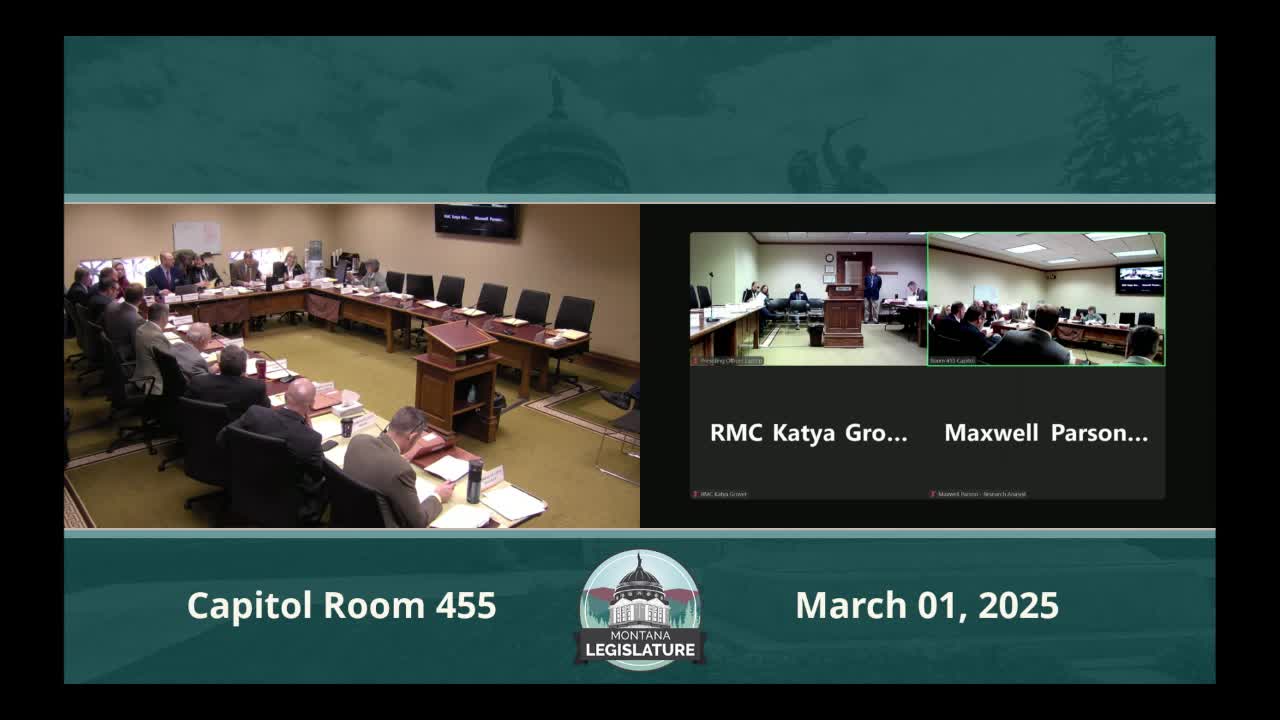Committee adopts amendment requiring quicker county notice for large‑predator relocations
March 01, 2025 | Fish, Wildlife and Parks, House of Representatives, Legislative, Montana
This article was created by AI summarizing key points discussed. AI makes mistakes, so for full details and context, please refer to the video of the full meeting. Please report any errors so we can fix them. Report an error »

The House Fish, Wildlife and Parks Committee adopted an amendment to House Bill 648 on Saturday that replaces a 30‑day public notice rule with a set of specific notification points for large‑predator captures and relocations.
Representative Parsons explained the amendment (HB 648.1.2) before the committee, saying it removes the 30‑day notice period and splits notice into four situations: notification when a final plan to move a large predator is completed; notice when a plan to move a predator changes; notice within 24 hours of capture if the animal will be relocated to a different county or tribal jurisdiction than where it was captured; and notice within 24 hours of relocation when the relocation site previously was approved by the commission for bear relocations.
Representative Maness and committee members framed the change as a transparency measure so counties and tribal governments could be aware of planned captures and relocations in their jurisdictions. The amendment also sought to prevent situations in which an animal remains trapped for an extended period while stakeholders await notice or direction.
Quentin Kujala, chief of conservation for Fish, Wildlife, and Parks (FWP), reviewed the amendment on the record and told the committee the agency could work with the revised language. Representative Paul Fielder recounted past wildlife transplant operations and told the committee that a 24‑hour notification period is feasible: "24 hours will work for wildlife transplants," he said, citing experience moving animals across state waterways and overnight holds.
Committee members voted to adopt the amendment by voice vote and later moved the amended bill. Proxies were recorded for absent members and the chair characterized the committee vote as unanimous; House Bill 648 will advance to the House floor as amended.
The committee’s amendment narrows the prior draft’s timeline while ensuring quicker, event‑driven notice to local governments and tribes in cases of capture or relocation. Fish, Wildlife, and Parks staff said the agency can operate under the new timeline but will coordinate implementation details with counties and tribal entities as needed.
Representative Parsons explained the amendment (HB 648.1.2) before the committee, saying it removes the 30‑day notice period and splits notice into four situations: notification when a final plan to move a large predator is completed; notice when a plan to move a predator changes; notice within 24 hours of capture if the animal will be relocated to a different county or tribal jurisdiction than where it was captured; and notice within 24 hours of relocation when the relocation site previously was approved by the commission for bear relocations.
Representative Maness and committee members framed the change as a transparency measure so counties and tribal governments could be aware of planned captures and relocations in their jurisdictions. The amendment also sought to prevent situations in which an animal remains trapped for an extended period while stakeholders await notice or direction.
Quentin Kujala, chief of conservation for Fish, Wildlife, and Parks (FWP), reviewed the amendment on the record and told the committee the agency could work with the revised language. Representative Paul Fielder recounted past wildlife transplant operations and told the committee that a 24‑hour notification period is feasible: "24 hours will work for wildlife transplants," he said, citing experience moving animals across state waterways and overnight holds.
Committee members voted to adopt the amendment by voice vote and later moved the amended bill. Proxies were recorded for absent members and the chair characterized the committee vote as unanimous; House Bill 648 will advance to the House floor as amended.
The committee’s amendment narrows the prior draft’s timeline while ensuring quicker, event‑driven notice to local governments and tribes in cases of capture or relocation. Fish, Wildlife, and Parks staff said the agency can operate under the new timeline but will coordinate implementation details with counties and tribal entities as needed.
View full meeting
This article is based on a recent meeting—watch the full video and explore the complete transcript for deeper insights into the discussion.
View full meeting
